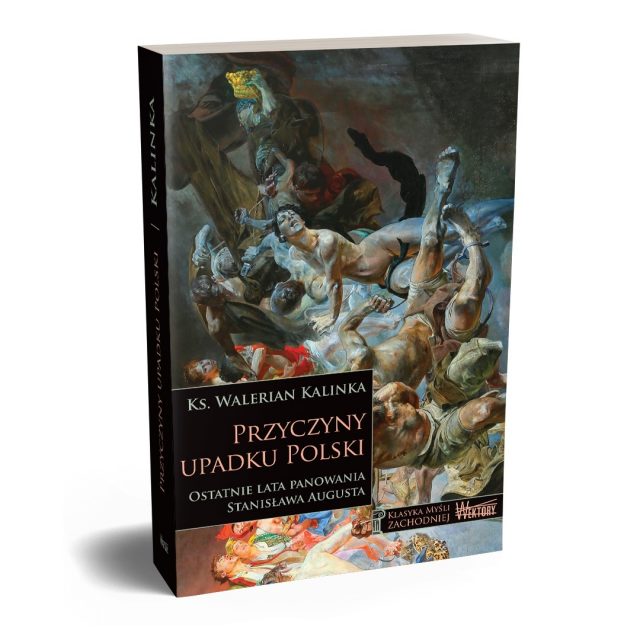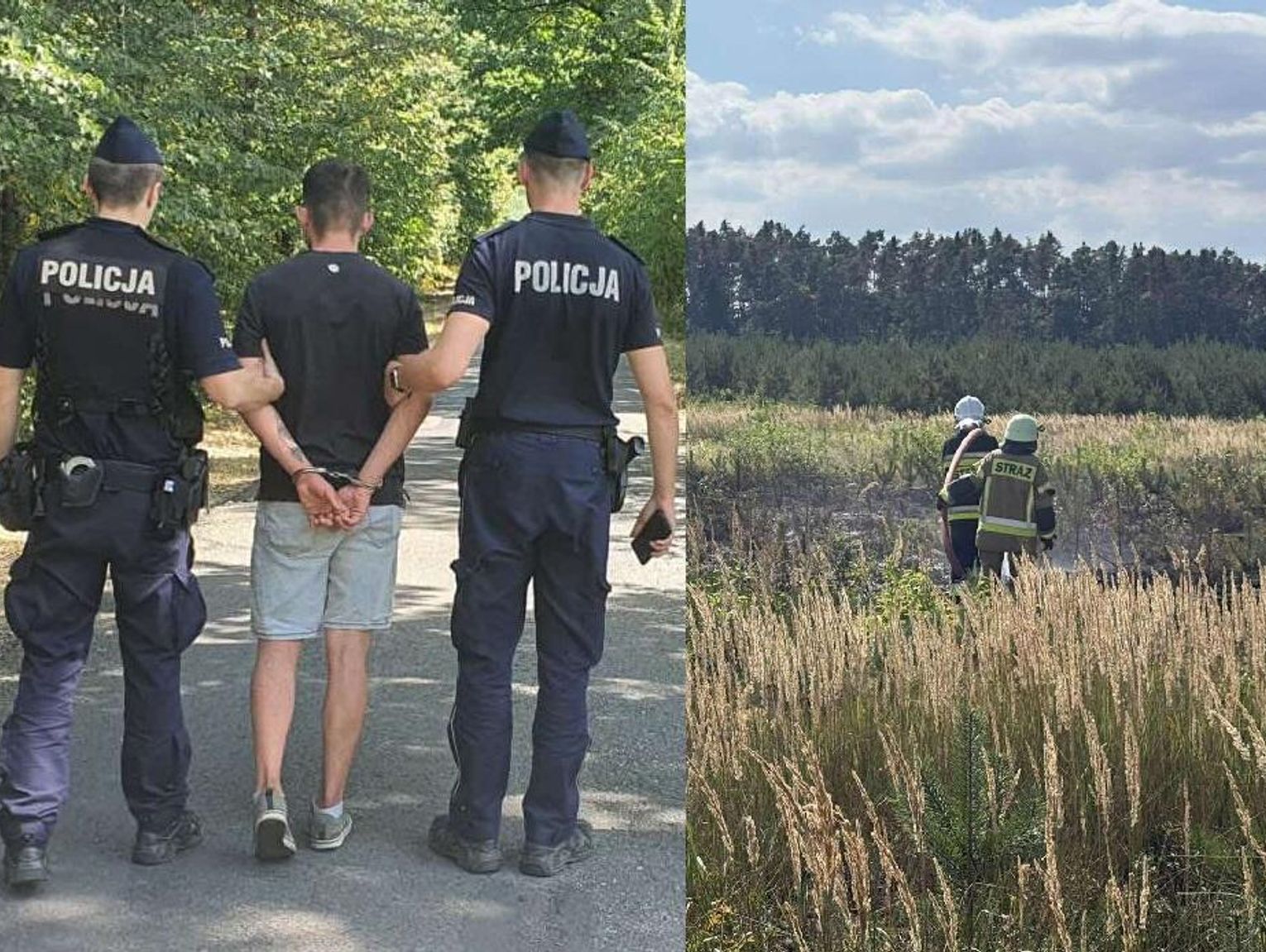“Students... do not philosophize and no of them want to be wise. For that is all the misfortune in stupidity, that a man is neither beautiful nor good nor wise, but he thinks that it is adequate for him. For if a man thinks that he lacks something, will he desire what he thinks he is not dealing with?"
Plato, ‘Hotship’
Recently published by the Vektora publishing house, the work of 1 of the co-founders of the Krakow past school of the priest Valerian Kalinka "Causes of Poland's fall. The last years of the reign of Stanisław August” is next to “Today of Stupidity” by Alexander Bocheński most likely the loudest position from the current, which blames us for Polish historical disasters in the first place not strangers, especially our neighbours, but ourselves. In addition to document-based reliable political analysis, the author devoted much space to the causes of specified and not another political actions by individual actors of the then political theatre. Importantly, unlike contemporary political realists, he was not afraid to show how political moves affect the psyche and character of both individual actors and nations.
This quality besides makes the book read at times like a novel, and the words of appreciation belong to publishers and editors, thanks to whom the language has been modernized, but has not lost anything of its colour and surviving style.
Convincing Poland's political folly someway penetrated into mass consciousness – it can be heard about in cabarets, jokes, in calls for "awakening" social media entries. However, Kalinka does not see in stupidity the origin of Polish weakness and final defeat. The Poles who appear on the pages of his book are not only noble men who do not realize the evil world, though they are, but also, above all, devoid of character and moral principles "inflated with pride" vain heads of the envious "hunted" just superficial religiousness.
And this is the first conclusion that comes from reading for us: stupidity nevertheless to realize it, and St. Thomas mentions as many as 23 kinds of fools, is not the only fatal characteristic of the magnate elites and noble masses of Poland before the partition. The image of somewhat naive, but lovers of the freedom of romantics, is alternatively an iris that we have created as better sounding than painful fact about ourselves. The truths about the nation, which 3 centuries ago invited Russian troops into its territory, and then practically without a fight allowed for further partitions.
Kalinka is more close to Norwid, who writes about “the demolition of the nation” in this assessment of the causes of our weakness, Ksaver Pruszyński and his “truth of ourselves, which we do not gotta forgive” by essay by Wańkowicz about “Polish mutt”, Witkaci trying to “wash Polish souls” or Gombrowicz ripping off our masks and mines. And if we chose “Mr. Tadeusz” from the nostalgic spell and genius of poetry, then we can see that besides our national epos were able to migrate into collective consciousness so that it did not irritate our ego. The cut from the screening was crucial Andrzej Wajda a fragment in which Maciek Dobrzyński criticized Napoleon's expedition to Moscow.
The second conclusion is, or rather, it is an irresistible certainty that we take after reading the work of Father Kalinka, that despite the 2 and a half centuries which have passed since the times described by him, nothing, but it is absolutely nothing in the heads, hearts, characters of both elite members and average Poles changed. any passages of the book sound almost like Kalinka is watching and describing not eighteenth-century magnates, noblemen, skirmishers, plotters, fools and traitors, only today's mainstream politicians, or struggling for the popularity of youtubers. He himself reveals akin feelings by comparing the times and people described with those he observed centuries later in his life. At this point, it should be recalled that at the threshold of Kalinka's adulthood, he became active in the Polish insurgent movement, taking part in the Krakow Revolution of 1846, to then be permanently separated from him. The confrontation of political practice and cognition resulting from historical investigation led to the following reflection on the sustainability of Polish flaws, which are part of our national character:
“Every national movement now throws out, from lower or higher classes, a full series of fresh people, and looking at them, you would say that it was from the grave that the ancestors rose, known so well, though without the crimson of the haughty, which only the fields and means lacked to fill the old public meetings with their own person, to suppress, to bind confederations all over the country on their own hand, to decide about the full Republic of Poland! It is uncommon in which a nation, despite disasters and terrible varieties, has maintained for long generations specified as ours, the uniformity of dispositions: what happened in the 17th and 18th centuries, it would besides be possible to repeat without a tiny 1 present without informing the conscience and the past." At the time there was no Facebook, you tube, live’s, and akin inventions, another 150 years passed, and all more critical observer of modern political life after reading the work by Valerian Kalinka must come to an identical conclusion, and given the passing of time, an even more amazing conclusion.

At the head of Polish flaws there is no folly or even ignorance. The first flaw, and in another sense the sin which we charge with our national consciences is, according to Kalinka, pride. This is evident in the following passage: “Though the origin of alien supremacy may be far above us, there are besides any that lie close us, possibly within ourselves. And the chief was and is rooted in us pride, stronger than all vices or virtues, has grown above all principles and feelings, capable of transforming soft and drowsy natures into darts, persistent and full of energy; pride the more dangerous that it does not exclude at all the love of the homeland, and even to any degree spiritual feelings, that it directs all people who can sacrifice for the country: peace, name, wealth, and life, but beside it, they will sacrifice and all, besides the country, their own tastes and personalities; pride of the family, property, reason, or talents, and even themselves, so different in their shades as infinitely as in their aftermath, not suffering any superiority between us and making all Pole so hard and unfriendly to his fellow countrymen as he makes him—in retaliation of this sin meek and humble to foreigners. The most delicious of the nations and possibly so the most trampled.”
This humble attitude towards foreigners is noted by Kalinka besides in his contemporaries and writes"Whoever has looked at the conduct of Poles with foreigners, he will admit that to this day there is simply a special, excessive warm-up to them, excessive respect for easy becoming dependent. (...) We are fed up with the fever of establishing relations with foreigners, we like to base our esteem on them, and in fact there is small of us to be serious so that the alien is easy incapable to overturn or strain them.” What is the difference between these observations and the “morzność” which Radosław Sikorski spoke about at the minute of sincerity, but besides from everyday observations of the behaviour of Polish scholars, officials?
The disastrous influence of Polish women on Polish politics is besides the subject of Kalinka's reflections, and it is characterized as follows:“This is usually a bad quality of age erstwhile women play a function in public matters besides active and loud; this is at least a proof of deficiency of character in men/.../ The king of light life, he made lovers in a woman's planet of fierce enemies. The rejected lover took revenge on a skilful substitute, leading her household to the opposition camp. (...) It was thus formed in the highest spheres of the women's league society, which, though frequently divided with each other, at that time against the king were able to bind." These observations besides sound acquainted to the readers of Dmowski and his "Thinks of a Modern Pole", but present it seems that, as in many another weaknesses, we have just overtaken the world.
As a consequence of selfishness, pride, envy toward superiority is hating mediocrity and money. How modern is this passage: “Whoever has had the chance to look at our free deliberations has surely come to believe that nothing is easier with us than silence of reason—so is the weak and self-shamed; whatever sentence, if spoken with fire, will rapidly take over him. That was a 100 years ago, and present is no different. If it were possible to explain the past of centuries past by accident, we would repeat the words of 1 of the Poles surviving in the east provinces:
"There is no doubt," he said, "that the nation mostly did not want to emergence up in 1863, that it feared and predicted defeat. How many times before the detonation were gathered more serious, they always condemned this intention as powerfully and unanimously as possible. But if there was even 1 young man among the 10 elders, and he boldly spoke for the uprising, neither 1 of us dared to defend his opinion. It cannot be said that hope is clouded by reason; rather, fear of unpopularity is stifling him." It is hard to supply better proof of the veracity of Zbigniew Herbert's opinion that: Poles deficiency the most crucial characteristic, which distinguishes men from men – civilian courage.
In his work, Walerian Kalinka besides beats the repentant story “of good people and bad politicians”. The Saxon agent quoted by him writes: “Listening to Polish citizens, you might think that erstwhile it comes to taxes, there is no homeland for them! They would like to blame everything on Jews, on clergy, on townsmen and on foreigners, but on themselves and on their peasants they do not accept any work towards the Republic." Joseph Piłsudski spoke 150 years later about the fact that we wanted independency for 2 cents and a drop of blood. In the 3rd Republic of Poland, most of the associations which were created massively after 1989 fell due to reluctance to pay contributions, which as a consequence were replaced with grants from abroad leaders. Morale of the nation is besides seen in the relations of this nation with the king, who, although deprived of his strong will and something that could be called a flash of manhood, always sought to repair the state. Fr Kalinka writes: “Nothing more average than complaints about Stanislaw August’s weakness, and in fact they are not without a basis; but in specified circumstances as the time, even Batory with his iron will could not save the country. Let us besides say that between the opponents of Stanisław August (except for the bishop of Sołtyk) we do not see any stronger men at all, we will not find them and later; so general in the nation was the softness of character despite or possibly the consequence of general shouting and shoes."
This shoe besides manifested itself toward its own king, whose insulting and insulting became a national athletics in those days. unusual ambassadors, on the another hand, enjoyed large respect, but he was primarily the consequence of seeing them as a tool to torment national rivals. As shortly as there was a belief that the situation had changed, and another ambassador is now the eventual arbitrator, then what seemed to be the favourite business of Polish politicians, but besides of human masses in relation to Russia and Russians. As small has changed, another passage shows: “On the benches of the 4 Year Sejm, among the applauses of the audience, they were allowed to mock her (Catarzyn – O.S.) customs. Unfortunately, throwing insults at our enemies and beating them, even though they were stronger, was a specified maneuver of most of our politicians, and sadly confess that to this day there is simply a surest way to gain patriot fame.” Finally, the striking ominous news of the summary of the Sejm's 1766 session: "The Sejm then divided erstwhile Moscow irritated and the Republic disarmed the remnant."
At this point it is worth mentioning the excellent and moments of the prophetic analyses of Kalinka concerning Catherine's Tsar and, above all, Russia itself. Kalinka shows a superb female in the field of plotting intrigues, evaluating characters, sensing strength and weakness, but only guided by individual ambitions and feelings, not the rationale of the state or the interest of the nation. The words of the Polish priest showing the effects of the acceptance of Enlightenment by the Russian elite from the West are pervasive or even prophetic:
"The Russian people do not know through what series of interior fights, voluntary sacrifices and labour the European nations went through before they stood at the tallness of their wealth, material and spiritual. She does not know the moral conditions of their power, and she is gluttonously cast upon not what is yet firm in this civilization and what her life, or whatever it is, assures, but what in this civilization is exuberant, monstrous quirk, what has in it the embryo of death. At the end of the 18th century, as a kid of the European society, the Russian people have on their forehead the fatal mark of the era of their baptism, and give or not the first to fall victim to the decaying elements which the memorable age gave. Already present in his educated classes there is no faith, there is little and little household life, there is more and more in the units of rampaging, which only until the time stops despotism of the government. Fear to think what blows the Russian community is cooking for itself, present so arrogant and assured of itself, on which ground all poisons from the West are strangely easy to take and so much strength in its energy and native wildness.” So here is besides the prophecy of the revolution and the anticipation of Dugin's observations and concerns expressed e.g. by specified a creator as Andrei Zwiegincev in his Unlove. In another place Kalinka indicates that Russia's vocation is the Asian direction.
The very part of the strictly political-historical work of Kalinka is an insightful analysis of the subtle diplomatic games of the large powers, but besides the game of influences in court. Poland appears in them not so much as a stupid entity, but above all helpless against its own faults, entangled in a Narovy, which has been nursed for respective centuries. The pursuits of common sense, honest work and patriotism appear to be like days without alcohol or another drugs in an addict hopelessly addicted to quarreling, condoning jealousy, asking for aid from strangers in fighting interior rivals, love for money and empty gestures. Kalinka, though priest, does not hesitate to stigmatize the Polish clergy who made specified creatures as Primate Gabriel Podoski, but what is more interesting Kalinka points to the shallowness of Polish Catholicism in general, writing about the atmosphere prevailing on the eve of the Radom and Bark Confederation:
"Warsaw was full of movement and noise. It seemed to be an act of advanced courage to treat with a abroad power without the cognition of its government, but with contempt for it. any believed in their heroism and patriotism, and reconciled in a alternatively peculiar way the feeling of godliness with pride and hatred, they approached the sacraments and claimed that they were given a revelation from God that the end of Poniatowski was close and infallible.”
Finally, the summary of the Bar Confederacy in Polish consciousness powerfully confused with the tradition of patriotism and the defence of religion by the “servants of Mary in Christ on the Ordinances”: “This step, writes Krasiński, Bishop of Kamieniecki, “was spurred by the same deceivers who lost us in Radom.” And indeed, despite the many beautiful sides of the Bar Confederacy, it is hard not to see similarities to the Radomic one: the same people, the same pride and hatred of the king, the same ignorance of public things, in the deliberations of violentness, in decisions and actions of recklessness, and yet the consequences of both bitter and deadly! (...) The Portuguese Confederation was the last and direct origin of the first partition of Poland.”
In addition to the analysis of our unchanging national character, which seems to be the most valuable from the present point of view, due to the fact that in showing the sources of our weakness current, the reader will find in the work of Valerian Kalinka many another parallels to the present times. An alien ambassador maintaining the balance of 2 sides and ensuring that no 1 takes the mountain, will stand by the Russian army as a guardian of the rights of the dissident number like the message of Ambassador Brzeziński that "the American army in Poland is here to defender the regulation of law" and to add "the TVN Party", to guarantee that the improvement of the judiciary and administration is prevented. Different times, but again it turns out that small wisdom is adequate to regulation our nation.
The way to repair it would be in Kalinka's view not only to learn from past mistakes on a political level, but above all to work on its character on both a national and an individual scale.. After reading the work of priest Kalinka, it seems that contrary to myths of noble people and bad politicians, Polish politics is simply a reflection of the defects of individual elite members and masses supporting them.. possibly the mediocre level of Polish politics in the time described by Kalinka and present besides stems from the belief in democracy at the expense of specified ancient cardinal virtues as which was considered moderation, justice, prudence and valor? I'm certain it's worth considering. due to the fact that according to the German philosopher Dietrich von Hildebrand The relation between stupidity and a broad sense of morality is apparent In 1 of his essays, he put it this way: “There is simply a light in goodness that lends good intellectual dignity to a man. A truly good man is never stupid or limited, even though he is not very rotational in his head and has no talent for intellectual activity. But all bad man is actually always limited, even stupid, even with superb intellectual achievements.”
How pride connects with stupidity and inaccuracy is well illustrated by the example of Lech Wałęsa, who was delighted with having a certain amount of common sense by himself, boasted that it was well-sponsored; as the first man since Homer's time he created a book, having never read it before, but that Polish politicians do not see the request to read books, he pointed out in relation to the Cat-Mackiewicz interwar. I was reasoning about the library. Carl Gustav Mannerheim in his home – a museum in Helsinki, there were thousands of books divided into separate shelves, each in 1 of respective languages. There was not yet a request to “learn throughout life”, but this large and victorious statesman felt the request to get acquainted with the thoughts of others, knew and accepted that he did not know everything, and unlike Plato's fool described, he wanted to realize more.
Olaf Swolkień
Fr Walerian Kalinka, "About the Causes of the Fall of Poland. The last years of the reign of Stanisław August", Wyd. Vectory, Wrocław 2023, p. 276.
Think Poland, No. 5-6 (28.01.-4.02.2024)
















